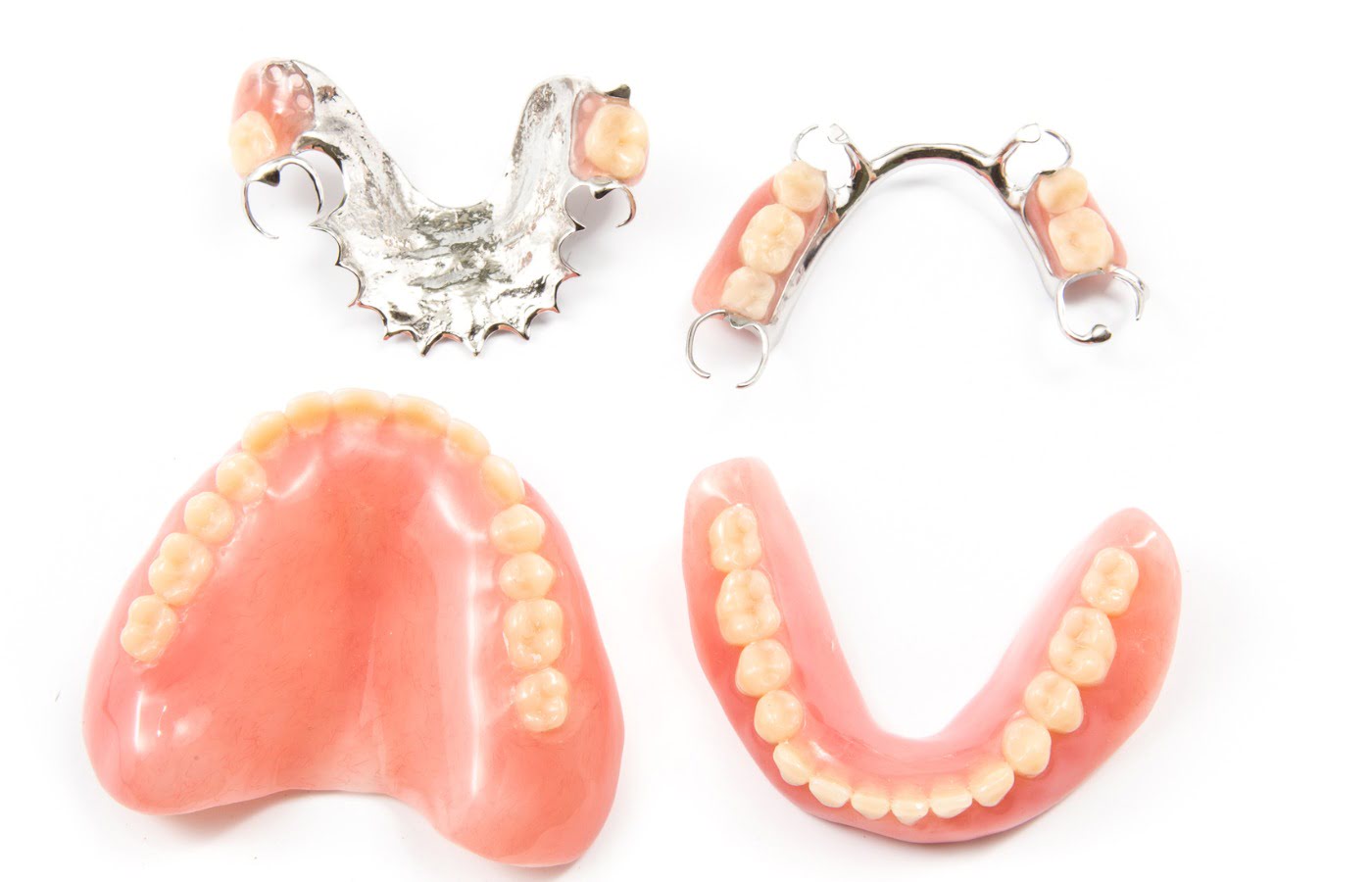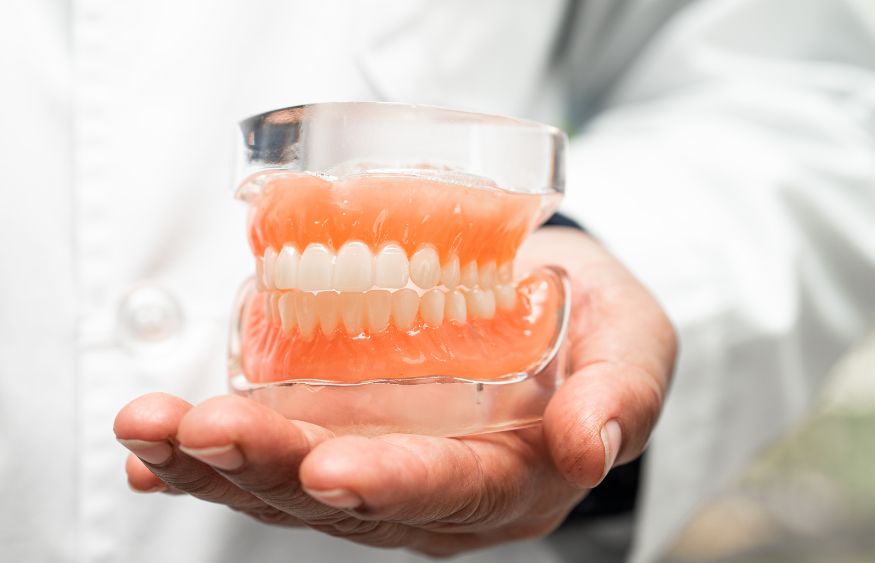
When it comes to restoring your smile and improving your ability to eat, speak, and enjoy life, dentures offer a highly effective solution. Whether you’ve lost teeth due to age, decay, or trauma, dentures can bring back functionality and aesthetic appeal to your smile. However, when it comes to choosing the right type of dentures, there are two main options: full dentures and partial dentures. The decision between full and partial dentures depends on the number of teeth you’ve lost, the condition of your remaining teeth, and your personal preferences.
Dentures are removable dental appliances that are custom-made to replace missing teeth. They are designed to restore the appearance and function of your teeth, helping you regain confidence and improve oral health. Dentures are typically made from materials like acrylic, metal, or flexible resin, and are custom-fitted to your mouth by a dentist or prosthodontist.
Dentures come in two main types:
1] Full dentures, which replace all the teeth in the upper or lower jaw.
2] Partial dentures, which replace only a few missing teeth and are designed to fit around your natural teeth.
Let's break down both options to help you make an informed decision.
Full dentures, also known as complete dentures, are used when all the teeth in either the upper or lower jaw are missing. These dentures are designed to cover the entire dental arch and are secured in place using natural suction or a denture adhesive.
Full dentures are typically made from acrylic or a combination of acrylic and metal. They are custom-made to fit the patient’s gums and mouth, providing a natural-looking and functional replacement for missing teeth.
1] Restores Full Functionality: Full dentures restore the ability to chew and speak properly, making them an essential option for those with extensive tooth loss.
2] Improved Aesthetic Appearance: Full dentures improve the appearance of your smile, filling in gaps caused by missing teeth and boosting self-confidence.
3] Cost-Effective: For patients who need to replace an entire set of teeth, full dentures are generally more affordable compared to dental implants or other restorative options.
4] Non-invasive: Unlike dental implants, which require surgery, full dentures are a non-invasive solution, which is ideal for those who may not be candidates for surgical procedures.
1] Potential Discomfort: Initially, full dentures can feel uncomfortable as they take some time to settle in. Adjustments may be necessary to ensure a comfortable fit.
2] Requires Maintenance: Full dentures need to be cleaned regularly and may require periodic adjustments to maintain their fit and functionality.
3] Limited Durability: Although full dentures are durable, they may wear down over time and may need to be replaced every 5-7 years, depending on usage.

Partial dentures are used when some natural teeth remain in the mouth. These dentures are designed to fit around your remaining teeth, filling in the gaps caused by missing teeth. Partial dentures are custom-made to match the shape, color, and size of your natural teeth.
There are several types of partial dentures, including:
1] Removable Partial Denture: This is the most common type of partial denture, made of acrylic and sometimes metal. It is designed to be removed and cleaned by the patient and is supported by the remaining natural teeth.
2] Flexible Dentures: from a flexible material, flexible dentures are an option for those looking for a lighter, more comfortable denture. These dentures are designed to bend with the mouth’s movements and are less likely to cause irritation or discomfort.
3] Cast Partial Dentures: A cast partial denture is a high-quality type of partial denture made from a combination of metal and acrylic. The metal frame makes the denture stronger and more durable, while the acrylic teeth blend naturally with the surrounding teeth.
1] Restores Functionality: Partial dentures help restore chewing and speaking abilities by replacing missing teeth without requiring the removal of healthy natural teeth.
2] More Affordable: Partial dentures are generally more affordable than other alternatives like dental bridges and implants.
3] Non-invasive: Like full dentures, partial dentures are a non-invasive solution, making them an attractive option for individuals who may not be candidates for more invasive treatments.
4] Preserves Remaining Teeth: Unlike bridges, which require altering existing teeth, removable partial dentures can help preserve the structure of your remaining natural teeth.
1] Potential for Slippage: Since removable partial dentures are not permanently fixed, they can sometimes shift or slip out of place, especially when eating or speaking.
2] Requires Adjustment: Partial dentures may need to be adjusted periodically to ensure a proper fit as your mouth changes over time.
3] Maintenance: Like full dentures, partial dentures require regular cleaning and care to ensure their longevity and avoid plaque buildup.
1] Number of Missing Teeth: The most obvious factor when deciding between full and partial dentures is how many teeth you have lost. If all your teeth are missing, full dentures are the right option. If you still have some healthy natural teeth, partial dentures will be a better solution.
2] Condition of Remaining Teeth: If your remaining natural teeth are healthy and strong, a removable partial denture might be the best choice. However, if your remaining teeth are compromised or unstable, full dentures may be necessary.
3] Comfort and Fit: Partial dentures can be more comfortable for some patients, as they don’t cover the entire mouth. However, full dentures may provide better functionality for those with extensive tooth loss, as they replace the entire dental arch.
4] Cost Considerations: While both full and partial dentures are more affordable than dental implants, partial dentures tend to be less expensive than full dentures if only a few teeth need replacing. The cost will also depend on the type of partial denture, such as cast partial dentures or flexible dentures.The Dentures price starts from Rs.15000/-
Proper care and maintenance are essential to ensuring the longevity and functionality of your full or partial dentures. Some tips include:
1] Regular Cleaning: Clean your dentures after every meal to prevent food particles from accumulating. Use a denture brush or a soft toothbrush and a non-abrasive cleaner.
2] Proper Storage: When not in use, store your dentures in a container of water or a cleaning solution to prevent them from drying out.
3] Routine Check-ups: Visit your dentist regularly to ensure your dentures fit properly and to check for any signs of wear and tear.
4] Avoid Hard Foods: While dentures are durable, they can be damaged by hard or sticky foods. Be cautious and avoid foods that could harm your dentures.
If you're looking for dentures near me, it’s important to choose a reputable provider who offers a range of options, including removable partial dentures, flexible dentures, and cast partial dentures. Diagnopein is a trusted name in dental care and prosthetics, with a focus on providing high-quality, custom dentures tailored to your needs.
Our experienced team at Diagnopein can help you determine the best option for your smile, whether you require full dentures or partial dentures. With centers located in Pune, Mumbai, Nagpur, and Delhi, we offer personalized care and professional advice to help you choose the right dentures for your unique situation.